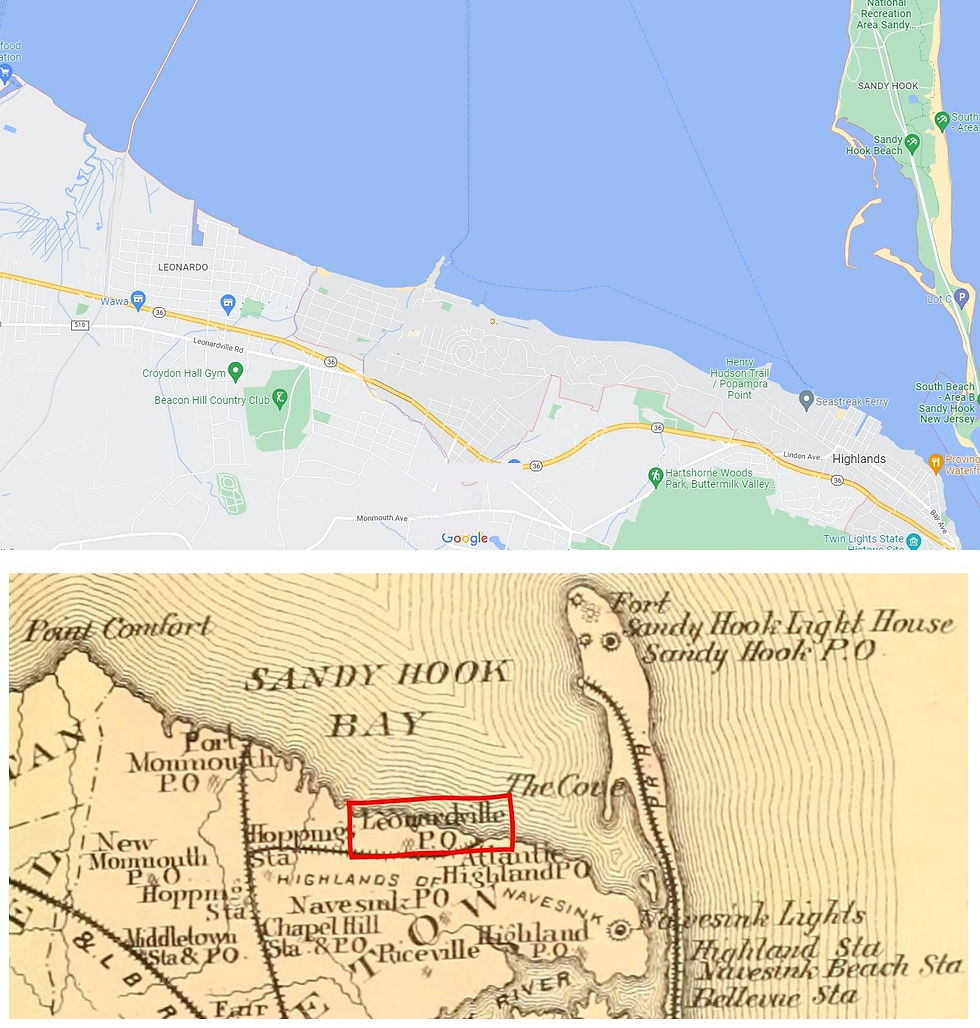Leonardville, Monmouth County, New Jersey
- Apr 21, 2022
- 3 min read
Many American towns are named after the families who originally settled the place and you might be surprised to find these places linked to your ancestors if you dig in to the history of the town. (You can use my County Search Tool to easily see if any counties, towns or cities are named after your family. Then check resources for that place to check for clues).
In New Jersey there is an unincorporated place called "Leonardo", located in Middletown Township, Monmouth County. I remember passing through Leonardo a few year ago on a trip to the Twin Lights in the Atlantic Highlands. I had assumed that Leonardo wasn't named after the Leonard family, because of the "o", but a little investigating revealed that Leonardo was, in fact, named after the Leonards.
"James and Henry Leonard came from England, in 1642, to Taunton, Mass., and from that time to about 1667 were engaged in constructing iron-works in the eastern colonies. James Grover, one of the Monmouth patentees, settled at Middletown in 1667, and while surveyor of the township, a few years thereafter, discovered traces of bog-ore at or near the Falls of Shrewsbury. He sent for the Leonards to come to New Jersey to construct iron-works, which they did, as mentioned." [History of Monmouth County, by Franklin Ellis, 1885, p. 543].
Comparing the old map in the book with a modern map, we can see that Leonardo is the same location formerly called Leonardville, home of the Leonard family.

"The Leonardo section of Middletown was a part of Atlantic Highlands and originally called Leonardville. It was named after Henry and James Leonard, the first ironmasters in the state. Croydon Hall was the home of John J. Leonard." [Source: Chang, Kathy; and Kesten, Karen L. "Birth of a town" Archived 2014-12-15].
Few people credit the Leonards with being the first to successfully establish an ironworks in America, unfortunately. In fact, several years ago I visited the blacksmith at Allaire State Park in Wall Township - a mere 22 miles from Leonardo, and the "blacksmith" knew nothing about James and Henry Leonard who, along with generations of their descendants, supplied the colonies with iron products essential for building homes, businesses, carts and carriages. They made nails, horseshoes, farm equipment, and all kinds of iron tools necessary for building the foundations of this nation. Prior to their arrival, iron implements had to be imported or carried over with the colonists. Previous attempts to establish ironworks in America had failed mostly because of conflicts with the Native Americans, but James and Henry Leonard made peace with the Indians, contributing to their success. See my previous article "Secrets of Metal Making".
My paternal Leonard family hails from New York and I've only been able to trace my Leonard line back to my 4th great-grandfather, Russel Leonard, who married Sophronia Burrill, but based on my father's haplogroup, it appears he is of Solomon Leonard's lineage. Solomon Leonard lived in New England during the same period as James and Henry Leonard, as well as John Leonard of Springfield, Massachusetts, but most Leonard researchers have stated that there is no evidence that Solomon was related to John or the brothers, James and Henry. In fact, the haplogroups prove they're not connected, if we are understanding them correctly. Still, descendants of my ancestors, Russel and Sophronia Leonard, may descend from both James Leonard and Solomon Leonard. How? Well, I found that Joshua Burrill - who I suspect was Sophronia's father, reportedly descended from James Leonard. Unfortunately, I haven't been able to find any documentation to prove that Sophronia was Joshua's daughter. The only evidence I have found so far is that my DNA matches several of Joshua's descendants. I hope to one day prove my connection to these industrious Leonards - the Ironmasters.
If you're interested in the Leonards who founded Leonardville, check out these clippings from History of Monmouth County. You can access the entire book free online, but feel free to save or print this Leonard summary.
See more:
#leonard #newjersey #monmouthcounty #leonardo #leonardville #jamesleonard #henryleonard #ironmasters #colonial #industry




Comments